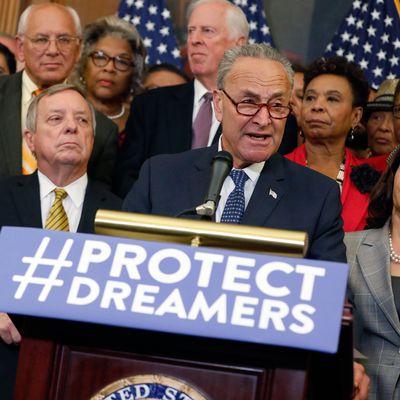
As Congress lurches toward the first of what may become several December or January crisis points over spending this week, the issue Democrats have been flirting with as an unconditional demand for their votes to keep the federal government open is protection for Dreamers.
This relatively popular category of roughly 800,000 undocumented immigrants, brought into the country illegally as children, has been exposed to deportation since Donald Trump revoked Barack Obama’s DACA (Deferred Action for Childhood Arrivals) program, which provided for protection from prosecution and access to work permits. Trump’s action, taken in September, doesn’t kick in until next March, and there have been desultory negotiations over a reinstatement of DACA in exchange for varying “border security” measures Republicans want, up to and including Trump’s highly symbolic border wall (a nonstarter for Democrats). So it’s not surprising congressional Democrats would really like to get protection for Dreamers as part of the price Republicans pay for getting their cooperation on must-pass spending legislation.
Indeed, five Senate Democrats and 25 House Democrats have publicly vowed not to vote for any spending legislation — even a short-term stopgap measure like the one Republicans are trying to engineer before the last stopgap bill expires this Friday — that does not include protection for Dreamers.
Making DACA a chess piece in spending negotiations is one thing. (A September poll from Morning Consult showed that only 15 percent of Americans — and only 24 percent of Republicans — want to deport Dreamers.) Actually being willing to shut down the government by denying Republicans votes for a spending bill (they need at least eight Senate Democratic votes to overcome a filibuster, and perhaps some House Democratic votes to offset defections from conservatives who oppose nearly every spending measure) is another thing altogether.
And a new Morning Consult poll this week showed that only 25 percent of Americans believe protecting Dreamers is a proper justification for shutting down the government. Worse yet, only 34 percent of Democrats like the idea (support among independents, at 20 percent, is identical to the number of Republicans going along with it). That’s a pretty small army with which to go to war, particularly since Republicans can plausibly argue that Dreamers are in no real peril until March. And the dynamics could even flip the conventional wisdom that the party controlling the federal government will get blamed for a shutdown, particularly since Donald Trump is almost certainly spoiling for a fight. On the other hand, it should be noted that past government shutdowns — e.g., those in 1996 and 2013 — usually occurred in periods of divided government, so it’s not entirely clear how the public would react to a shutdown when one party controls everything.
Democrats don’t have much time to make up their minds on their negotiating strategy. The more Democrats rattle sabers over DACA, the greater the backlash among pro-immigrant groups if and when they back down. There are other issues that have greater popular support as potential triggers for a shutdown — in the Morning Consult poll, for example, 42 percent of Americans, and over half of Democrats, think restoring funding for the Children’s Health Insurance Program is such an issue. But making it all about Dreamers, and meaning it, is not necessarily a smart strategic move.






























